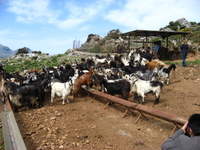 This week on Food For Thought, I take you back to the Greek island of Crete where I experienced an excellent day of culinary tourism. Listen to an MP3 of the audio file by clicking here. We started our morning atop a mountain where shepherds (or are they goatherds?) were milking their herd of goats.
This week on Food For Thought, I take you back to the Greek island of Crete where I experienced an excellent day of culinary tourism. Listen to an MP3 of the audio file by clicking here. We started our morning atop a mountain where shepherds (or are they goatherds?) were milking their herd of goats.
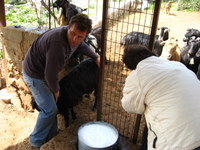 On top of the mountain there are no milking machines, not even any electricity to run them if there were! Instead, the men use highly trained dogs to round up the goats from wherever they are on the mountain, then herd them into a pen, pushing them forward so the men can grab them and milk them by hand, rapidly squirting the milk into a large can set into a concrete holder.
On top of the mountain there are no milking machines, not even any electricity to run them if there were! Instead, the men use highly trained dogs to round up the goats from wherever they are on the mountain, then herd them into a pen, pushing them forward so the men can grab them and milk them by hand, rapidly squirting the milk into a large can set into a concrete holder.
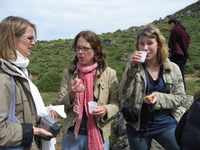 Here are my classmates MJ, Bronwen and Betsy enjoying some fresh cheese and raki. This was all taking place at about 10am, and raki is a fairly powerful liquor, somewhat like Italian grappa. Hour of the day means little to the Cretans, however. When I met the grandmother of the man whose place I was staying at around 8 one morning, she quickly offered me a shot of grappa. Since I had already imbibed what seemed like 25 shots in two days of our trip, I graciously declined.
Here are my classmates MJ, Bronwen and Betsy enjoying some fresh cheese and raki. This was all taking place at about 10am, and raki is a fairly powerful liquor, somewhat like Italian grappa. Hour of the day means little to the Cretans, however. When I met the grandmother of the man whose place I was staying at around 8 one morning, she quickly offered me a shot of grappa. Since I had already imbibed what seemed like 25 shots in two days of our trip, I graciously declined.
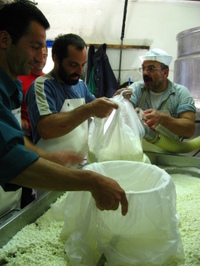 From the mountain we descended a few minutes into a village where the local cheesemakers process the milk we had just seen being obtained from the goats. They make several kinds of fresh and aged cheeses there, which we got to taste…along with more raki!
From the mountain we descended a few minutes into a village where the local cheesemakers process the milk we had just seen being obtained from the goats. They make several kinds of fresh and aged cheeses there, which we got to taste…along with more raki!
Just when we thought we had had enough drinking for the day, and were chock full of cheese, it was back into our vans to visit another tiny mountain village…where the whole complement of villagers was waiting for us.
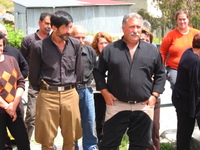 The typical dress for the men of Bis-dye-ee (phonetic spelling) are these hunter-style pants, usually black or tan, and black shirts, with a sharp knife stuck into their waistbands.
The typical dress for the men of Bis-dye-ee (phonetic spelling) are these hunter-style pants, usually black or tan, and black shirts, with a sharp knife stuck into their waistbands.
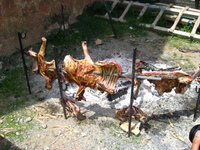 Before we went inside the village community hall we were treated to the sight and smell of goat roasting beside hot coals. This is a traditional way of roasting meat in Crete, skewering the meat on spikes and resting it on stakes pounded into the ground so the fat drips away from the meat without creating flare-ups.
Before we went inside the village community hall we were treated to the sight and smell of goat roasting beside hot coals. This is a traditional way of roasting meat in Crete, skewering the meat on spikes and resting it on stakes pounded into the ground so the fat drips away from the meat without creating flare-ups.
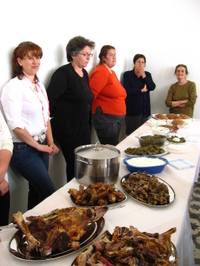 When we were finished with the greetings outside, we trooped inside the village community centre to see a massive display of foods lining the perimeter of a large room. Each woman in the village had brought a different traditional dish for us to try…. over 40 in total. There were pastries made with homemade strawberry and apricot jams, tiny fried pastry pockets filled with sweet cheese, savory pockets stuffed with spinach or wild greens, pork with wild greens, cured olives, umpteen artichoke dishes, rabbit and much more. There was no way we could try everything, but we did our best, along with tasting as many homemade wines that were pressed upon us. I have to be honest: the homemade wines we had in Crete were not very good…downright bad, actually. They tasted more like wine vinegar than wine, and after a week of drinking them, I certainly didn’t develop a taste for them. Most of the restaurants we went to serve their own homemade wine as well, if you go you may want to ask if they have any wine made at a winery.
When we were finished with the greetings outside, we trooped inside the village community centre to see a massive display of foods lining the perimeter of a large room. Each woman in the village had brought a different traditional dish for us to try…. over 40 in total. There were pastries made with homemade strawberry and apricot jams, tiny fried pastry pockets filled with sweet cheese, savory pockets stuffed with spinach or wild greens, pork with wild greens, cured olives, umpteen artichoke dishes, rabbit and much more. There was no way we could try everything, but we did our best, along with tasting as many homemade wines that were pressed upon us. I have to be honest: the homemade wines we had in Crete were not very good…downright bad, actually. They tasted more like wine vinegar than wine, and after a week of drinking them, I certainly didn’t develop a taste for them. Most of the restaurants we went to serve their own homemade wine as well, if you go you may want to ask if they have any wine made at a winery.
 We did visit a Boutari winery on Crete, and I was impressed with the wines we tasted there. The webpage for this 70-acre estate says it is called "Fantaxometocho", which means "ghosts’ glebe". The name that was given to the place "Fantaxometocho" was taken by the legend that was created in order to protect the glebe from sea dogs.
We did visit a Boutari winery on Crete, and I was impressed with the wines we tasted there. The webpage for this 70-acre estate says it is called "Fantaxometocho", which means "ghosts’ glebe". The name that was given to the place "Fantaxometocho" was taken by the legend that was created in order to protect the glebe from sea dogs.
That’s what the webpage says. Our guide at Boutari says the ‘ghosts’ in the name actually represent the people who used to sneak into the vineyard and steal the grapes!
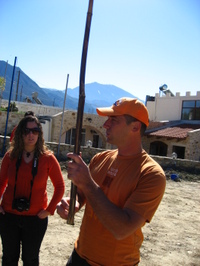 The day that you hear about in the documentary above is a prime example of the kind of culinary tourism Kostas Bouyouris wants to bring to Crete. As you saw on my blog last week, Kostas is an agronomist who is also involved with a Soil Health association and culinary tourism. He was with our class for the entire week and really gave us an authentic taste of Cretan life, not just through the food, but the music, art and above all, the people. If you are interested in reading more about what Kostas is involved in, visit the Mediterranean Association for Soil Health website. Much of the English side of the site is under construction, but there is an email address to contact for further information. For culinary tourism on Crete, which I highly recommend you experience at some point in your life, visit the Agrion Terra website. My next All You Can Eat podcast will feature my full-length interview with Kostas, so please check the link within the next week or so.
The day that you hear about in the documentary above is a prime example of the kind of culinary tourism Kostas Bouyouris wants to bring to Crete. As you saw on my blog last week, Kostas is an agronomist who is also involved with a Soil Health association and culinary tourism. He was with our class for the entire week and really gave us an authentic taste of Cretan life, not just through the food, but the music, art and above all, the people. If you are interested in reading more about what Kostas is involved in, visit the Mediterranean Association for Soil Health website. Much of the English side of the site is under construction, but there is an email address to contact for further information. For culinary tourism on Crete, which I highly recommend you experience at some point in your life, visit the Agrion Terra website. My next All You Can Eat podcast will feature my full-length interview with Kostas, so please check the link within the next week or so.
SPECIAL BONUS FEATURE!!! My classmate Marta loves taking portraits, both posed and candid of all of us when we are on our field trips, or ‘stages’ as they are known in our program. I downloaded some software called Photoshow which allows you to mix music and photos together with some special effects, and so I sifted through all the photos and put together "Classic Crete" . It is a .wmv file and hopefully it will just start playing in whatever player you have on your computer once enough of it has downloaded. The file is about 50 megabytes. Enjoy!

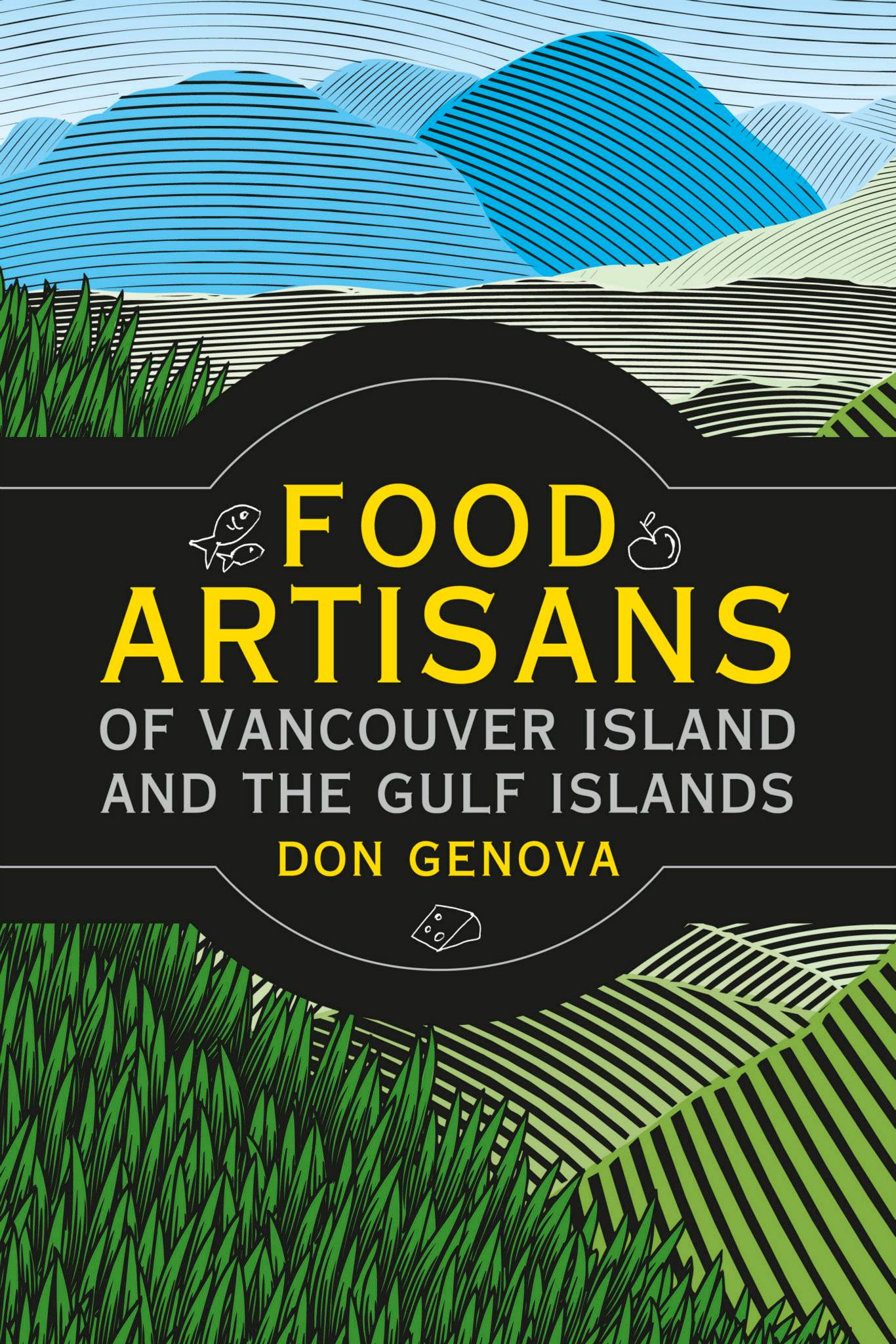

Were their any products you took home with you that were unique to the country?
I brought home some excellent olive wood utensils as well as some olive oil and a Cretan cookbook of traditional recipes and ingredients.